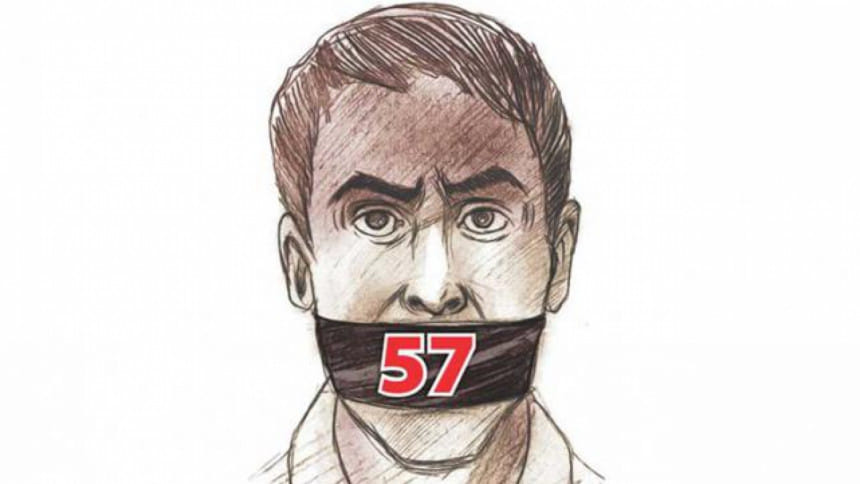Section 57 in new garb

Amid calls for the repeal of section 57 of the Information and Communication Technology Act, the government has decided to revoke the controversial section that is prone to misuse.
However, sources involved in the process said the contents of section 57 have been incorporated in the proposed Digital Security Act 2017 with some modifications.
Section 57 and other controversial provisions of the ICT act will be removed, as the draft of the Digital Security Act has been finalised, Information Minister Hasanul Haq Inu told reporters after an inter-ministerial meeting on the draft act at the law ministry yesterday.
The draft, to be sent to the cabinet for approval, will contain proposals for abolishing sections 54, 55, 56, 57 and 66 of the ICT act, he said.
According to section 57, if anyone deliberately publishes or transmits any false and obscene material on a website or in any electronic form, or causes deterioration in law and order or prejudices the state's image or hurts religious beliefs or instigates anyone against any person or organisation, such activity will be regarded as an offence.
The offender will face a maximum punishment of 14 years' imprisonment, says the section.
These offences have been included in various sections of the proposed act, said the sources.
Section 30 of the draft act says that if any person or group deliberately publishes or transmits on a website or in any other electronic form any material which creates enmity and hatred among different sections or communities or hurts communal harmony, or creates instability or anarchy or the possibility of deterioration in law and order, the activity will be regarded as a crime.
Such an offence will carry a maximum punishment of five years' imprisonment or a fine of Tk 5 lakh or both.
If anyone commits the crime twice or more, he or she will face a maximum punishment of seven years in jail or a fine of Tk 10 lakh or both.
In section 27 of the draft law, it has been mentioned that if any person or group deliberately publishes or transmits on a website or in any other electronic form any material which hurts anyone's religious sentiment, the activity will be considered a crime, and the offender will face a maximum jail term of five years or a fine of Tk 10 lakh or both.
If any person commits the offence twice or more, he or she will face a maximum punishment of seven years' imprisonment or a fine of Tk 20 lakh or both.
According to section 28 of the draft act, if anyone, through any website or in any other electronic form, commits any crime that falls under section 499 of the Penal Code, the person will face two years' imprisonment or a fine of Tk 3 lakh or both.
If anyone commits the crime twice or more, the punishment will be five years in prison or a maximum fine of Tk 10 lakh or both.
Section 499 of the Penal Code says, "Whoever by words either spoken or intended to be read, or by signs or by visible representations, makes or publishes any imputation concerning any person intending to harm, or knowing or having reason to believe that such imputation will harm, the reputation or such person, is said, except in the cases hereinafter excepted, to defame that person."
Another section of the draft act mentions that if any person keeps, sends or preserves any secret information by intruding into any government, semi-government, autonomous or statutory body through computers, digital machines, computer or digital networks or any electronic medium, the activity will be regarded as a computer or digital espionage crime.
Such an offence will carry a maximum jail term of 14 years or a fine of Tk 25 lakh or both.
If anyone commits the offence twice or more, the punishment will be life imprisonment or a maximum fine of Tk 1 crore or both.
The draft act contains another section which says that if a person, through digital or electronic devices, spreads or helps spread any propaganda against the spirit of the 1971 Liberation War or the Father of the Nation, he or she will face life imprisonment or a fine of Tk 1 crore or both.
After yesterday's meeting, Law Minister Anisul Huq said the provisions of section 57 will not be kept in the draft law in the same form.
Checks and balances could be kept in the Digital Security Act and also in the proposed Broadcast Act for ensuring people's freedom of speech, he said.
Earlier on several occasions, the law minister said the government would scrap the section and make things clearer in the Digital Security Act.
Yesterday, the information minister said the new act was formulated to ensure digital security of 16 crore citizens of the country.
"I hope the draft will be placed in parliament in the coming winter session," he said.
The next session of the House is scheduled to begin in mid-January.
Before the ICT act was amended in 2013, the maximum punishment for offences under section 57 was 10 years' imprisonment and a fine of Tk 1 crore. Besides, police had to seek permission from the authorities concerned to file a case and arrest any person under the law.
But through the amendment, the maximum jail term was raised to 14 years, and law enforcers were empowered to make arrests without a warrant.
Rights activists and journalists have been critical of section 57 from the very beginning. They say the section goes against the people's right to freedom of expression and free speech as it contains vague wording, allowing its misuse against newsmen and social media users.
The debate over the section and demands for its repeal intensified following the arrest of veteran journalist Probir Sikdar in 2015.
The journalist was arrested and sent to jail after he posted a status on Facebook.
Amid widespread criticism, Inspector General of Police AKM Shahidul Hoque on August 2 instructed all police stations to consult the legal wing at the police headquarters before registering any case under the section.
The ruling Awami League also directed its activists to take permission from its central unit before filing any case under the section.
Around 300 cases were lodged under the section in the first seven months of this year. More than two dozen journalists were sued and several of them were arrested.

 For all latest news, follow The Daily Star's Google News channel.
For all latest news, follow The Daily Star's Google News channel. 








Comments